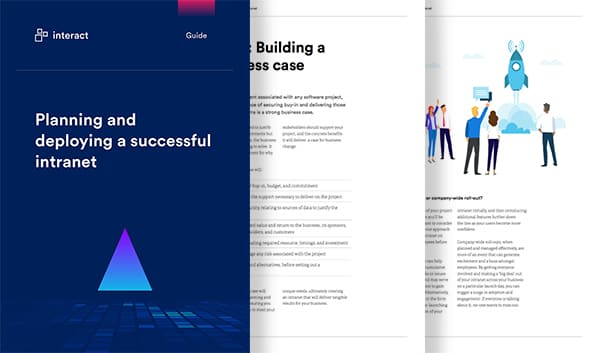Is your HR dept ready for the digital workplace? 4 ways to prepare

Despite the many digital transformations and technologies that are reinventing the conventional workplace, one factor remains the same – people are at the heart of the digital workplace. As the connection between people and organizations, is your HR department ready to take the lead?
When we take a snapshot of the future of the workplace, we see remote workers, new mobile applications, and employees that are fast adapting to these digital trends. Digital workplaces are on the rise and continually integrating into every facet of an organization, including Human Resources. So why fight it?

Human Resource departments, like other aspects of the business, are inevitably going to undergo their fair share of transformations. But as a department with such a significant role to play, HR professionals are forced to look at not only the benefits but also the overarching risks of a full digital transformation.
The HR barriers to the digital workplace
What one has to gain from the digital workplace is easy to see.
Building a connected digital workplace
A digital workplace incorporates tools that make the lives of you and your staff easier, from the technologies needed to fulfill their roles to fundamental business tools and applications. Examples include social media tools, intranets, employee portals, and HR software. With a complete transformation, organizations can expect to reap rewards like:
- An improved employee experience due to automated workflows
- More comfortable sharing of knowledge across time zones
- Greater mobility and ease of access to information
- More connectivity with increased social applications
Yet, in spite of all these benefits, this can come with a number of challenges for HR. HR’s prime function has since expanded beyond serving employees. Now, it is expected that they take a lead role in digital transformation.
Not only are HR professionals expected to facilitate productivity through new tools, but they are expected to upgrade their old training and hiring processes to fit the future.
Organizations want HR professionals to be progressive, and while that’s beneficial in the long term, it can prove challenging to keep up with all the innovation that occurs in the transformation process. It is no surprise that fewer than 20% of employers are prepared to adopt digital workplace technologies such as virtual collaboration and mobile tools, according to a new survey by research firm Gartner.
However, there is no way around it. Research from Deloitte indicates that 56% of HR leaders are being pushed to take on a larger role in driving their organizations toward digital transformation. While challenging, this is an opportunity for HR departments to own the mixing of both the digital and human aspects of the workplace. Here are four ways to prepare for the transformation.
#1: Create a digital transformation team
Turning your organization into a digital workplace requires the seamless collaboration of two central departments: IT and HR. Teamwork between teams is imperative to develop an efficient and productive communication model that generates success. If they do not, they can jeopardize the forward trajectory of the transformation process.
Combine and create your very own team of professionals. This group will strategize, develop a method to monitor progress and follow the developments of the digital transformation.

HR must trust that the IT department is introducing the right devices that will benefit their employees most. IT needs to trust that the HR department is keeping close track of the changes’ impact on employees and ensuring that everyone is happy.
Coordination and faster problem solving are only two of the benefits that a team can provide to HR.
#2: Monitor employee wellbeing
People are the most prominent aspect of the job of an HR professional. Catering to their needs will become a massive part of the process as they go through such a momentous change. Make their lives easier by establishing a way to assess and monitor staff temperament from the beginning to the end.

Organizations that address the emotional needs of their employees have a higher rate of retention as well as a higher level of engagement. Consider implementing some methods of two-way communication. Asking for employee feedback throughout every step of the process can be a helpful way of determining what is working and what is not. Forums via your company intranet or pulse surveys are an necessary to gauge the disposition of your employees as they go through digital transformation.
Happiness: the key to business success
#3: Combat resistance to change with transparency
One of the major changes that HR is expected to handle is any resistance to change that rises up during digital transformation.
While some may find it unlikely, the chance of finding some disgruntled employees is high. Employees tend to get very attached to their the status quo. This includes their daily routine, the tasks they are assigned and the technology they use to do their jobs.
Some employees will happily tackle the new systems and processes, but that will probably be a minority. Change means more training, more confusion, and more problems.

Counter this by being open and upfront about your process from the start. To instill an openness for change, employers must explain the reason behind it, challenge staff to see the big part of the company vision, and most of all – keep them updated every step of the way.
Share important updates with your staff via your intranet. Posting news on the homepage or sharing a blog post from leadership on upcoming changes will prepare your staff for what is to come.
#4: Acquire mobile-friendly technology
Millennials are predicted to make up 75 percent of the workforce by 2025, according to the Brookings Institution. This is a generation born into a digital world and raised on doing anything via social media and apps. The same applies to your HR workforce, many of which fall into the millennial category.

HR professionals are accustomed to having their needs answered anywhere, anytime with the click of a button in their personal lives. They will require the same in their professional lives.
Because it is common practice, you won’t need to force your employees to adapt to any mobile applications. Those things are second nature. Your mission is to create or utilize mobile apps that capture and keep the attention of your staff.
Digital HR
Change to any organization is a complicated ordeal that has repercussions for everyone within. During this process, HR must act as leaders to ensure that employees are comfortable, informed as well as adequately trained.
We recognize that this is a lot to put onto someone’s shoulders. However, success means embracing the digital workplace, adapting to the new technology and including every single stakeholder and department in the process.


